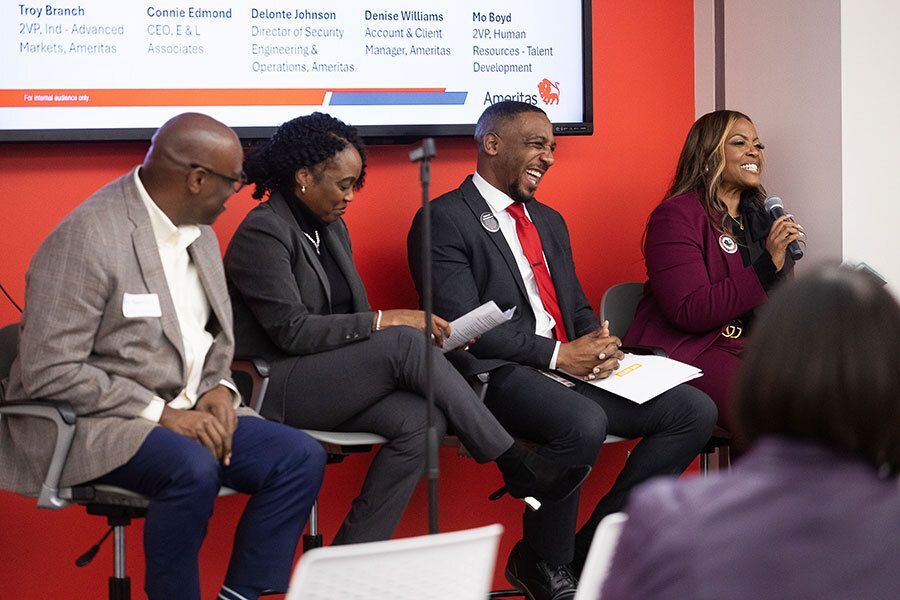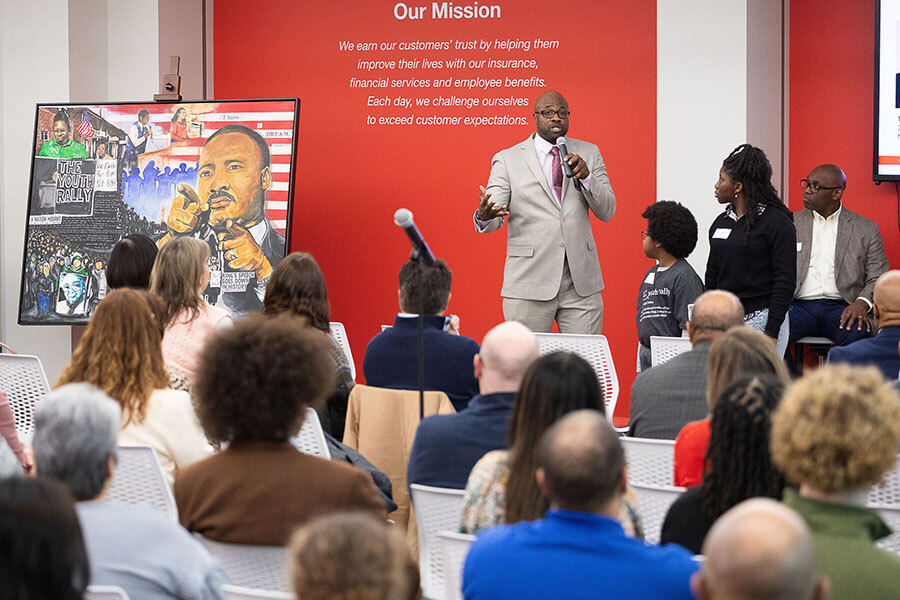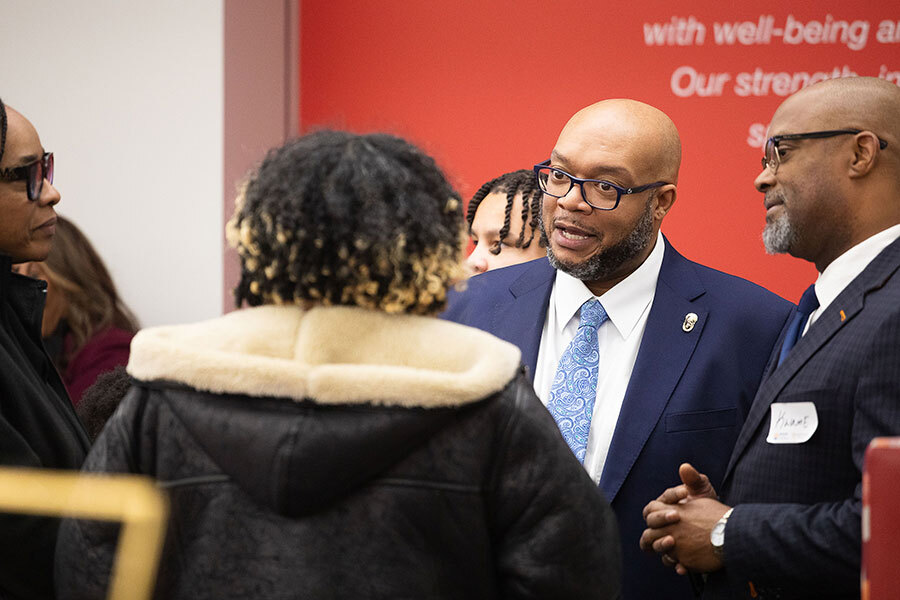
From left to right: Troy Branch, Connie Edmond, Delonte Johnson and Denise Williams.
“We’re better together,” said Connie Edmond, CEO of E&L Associates in Lincoln. “Not just one demographic. Not just one neighborhood. But the entire community, philanthropists together in unity.”
As a board member of Lincoln Community Foundation, Connie has joined with other leaders in advancing community conversations about Black Led Philanthropy. She also served as a panelist in their most recent event on financial literacy in early February.
She hopes that these conversations create a snowball effect, encouraging more people to participate in future events and discussions focused on Black Led Philanthropy.
"Everybody will walk away with a different takeaway," she said. “Whether that's skills and knowledge they can apply in their own lives or opportunities and connections they can build by meeting other attendees. It's all for the community's benefit."
Ameritas’s Black and African American Bison Strong resource group hosted the February panel in partnership with the Black Led Philanthropy group, LCF and United Way of Lincoln and Lancaster County.
The gathering was the latest in a series of community discussions developed from this collaboration. Prior events included an introductory session held at The Post in August, and a November panel of five nonprofits focused on the education and support of youth at Integrative Behavioral Health Services.
This group was formed out of a desire by both LCF and United Way to learn how they could better support the work already happening in Lincoln’s Black community, and to find ways to partner, promote and uplift existing philanthropy.
“It’s part of our mission to show how charitable giving and philanthropy is something we all can participate in,” said LCF President Tracy Edgerton. “We have a platform and knowledge that can amplify the work of our Black community members, to help connect our neighbors to the projects and organizations that reflect their values.”
The two organizations first met with a small group of Black leaders in the summer of 2023 to figure out what a partnership could look like. The conversations were rich, and necessary, said Peter Ferguson, one of the early participants. Peter has served on United Way’s board, is one of the advisers for the annual Rev. Dr. Martin Luther King, Jr. Youth Rally, coordinator of culture, inclusion, and scholar development and assistant supervisor of recruitment for Lincoln Public Schools.
“We probably have of the longest standing philanthropic giving that this community has seen,” he said. “Giving may be more informal — there’s no campaign, no giant check, no temperature graphic showing a goal. Instead, it’s giving through church, through fraternities and sororities and through family.”
Those first conversations recognized that ongoing and historical philanthropy, and how LCF and the United Way could work together to “celebrate and grow the acts of philanthropy — time, talent and treasure — and perhaps even consider some collective activities,” said Meagan Liesveld, executive director for United Way of Lincoln and Lancaster County.
Both Peter and Tracy described it as catalyzing in the way that it brought people together to gather information and ideas, and to act on them. There were folks in the room with connections to nonprofits, to city government, to schools, with a broad range of knowledge and expertise.
“It felt like being at the right place at the right time,” said Mo Boyd, second vice president, human resources - talent development at Ameritas and chair of the Black Led Philanthropy group.
Mo was also part of the early conversations. At first, he thought it was simply a good opportunity to work with community leaders he knew and some he was not as familiar with yet.
“I found myself being extremely engaged, being happy to ask a lot of questions, very participative and really wanting to take my experiences in Nebraska and outside of Nebraska and bring some of the thought leadership that I had developed over the years back to my home state,” Mo said.
Lincoln is one of the most welcoming places he’s lived, Mo shared, and he was excited to help “strengthen the community in a way that continues to feel welcoming and warm for everyone.”
Over time, more voices were added to the group, and they created a survey to learn how Lincoln’s Black community engages with charitable causes, what is most important to the community and to identify opportunities for future engagement. Four areas of focus were identified: education, financial literacy, mental health and mentorship.
“At the end of our year of listening, it is the hope that we may be able to determine one or two areas of deepest interest that this group of philanthropists and community members might be able to focus in on and support in some way together,” said Meagan.
A date for a fourth event hasn’t been set yet, but the results have already shown success. For the first two events, nearly 60 people attended and 80 registered for the February event at Ameritas.
“It says the community is responding to the events, and they like what they’re seeing,” said Mo.
The financial literacy panel also marked the opening of a month-long installation at Ameritas of the Rev. Dr. Martin Luther King, Jr. Youth Rally mural, titled 'Walk Together,' was created by local artist Jevon Woods and commissioned by the Rally Planning Committee to celebrate 30 years of the Rev. Dr. Martin Luther King, Jr. Youth Rally. Committee members welcomed the attendees with inspiring speeches to begin the conversation.
“Our youth have, not just for the last 30 years, but also throughout time, been the leaders in the philanthropic movements,” said Peter. “It’s important to have a seat at the table alongside older community members, both to learn from them and be part of the conversations that impact their future.”
 Peter Ferguson and Rally scholars present the Rev. Dr. Martin Luther King, Jr. Youth Rally mural, commissioned by artist Jevon Woods.
Peter Ferguson and Rally scholars present the Rev. Dr. Martin Luther King, Jr. Youth Rally mural, commissioned by artist Jevon Woods.
Along with Connie Edmond, panelists included fellow financial experts Troy Branch, second vice president for individual advanced markets at Ameritas, Delonte Johnson, director of security engineering and operations at Ameritas, and Denise Williams, account and client manager at Ameritas. The event was emceed by Mo Boyd.
“People can be traumatized by financial experiences,” shared Connie, so they don’t talk about it.
The panelists turned that stigma on its head, sharing from their own experiences and their connections with one another. It was clear that participating in the panel was more than something they were doing for work, but rather a way to give back to the community.
That’s something else Connie emphasized, that money isn’t the only way to engage in philanthropy.
“Everybody thinks it’s about money, but God has gifted you with talents,” she said. “Philanthropy can be a time investment — through mentoring, advocating and volunteering. It could be through skills and knowledge.”
“Every one of us can be a philanthropist,” agreed Tracy. “The value of philanthropy isn’t just in the people who have the capacity to give high amounts of money. It’s in each of us, in our capacity to love and care, and support the causes that reflect the values of our Lincoln community.”
 Mo Boyd (center), second vice president, human resources – talent development at Ameritas and chair of the Black Led Philanthropy group chats with attendees after the February panel on financial literacy.
Mo Boyd (center), second vice president, human resources – talent development at Ameritas and chair of the Black Led Philanthropy group chats with attendees after the February panel on financial literacy.
